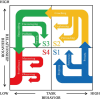Situational leadership theory in nursing management: a scoping review
- PMID: 39702117
- PMCID: PMC11660562
- DOI: 10.1186/s12912-024-02582-9
Situational leadership theory in nursing management: a scoping review
Abstract
Aim: To provide a comprehensive overview of situational leadership theory as applied to nursing management, outlining its relevant measurement tools, intervention modalities, and reporting gaps.
Design: A scoping review of the literature was conducted according to the JBI guidelines.
Data sources: Eight databases were used including PubMed, Embase, CINHAL, Web of Science, CNKI, WanFang, Cqvip, SinoMed. References of included studies were also searched. All literature published up to 9 September 2024 was included.
Review methods: According to the PCC framework, the search formula was developed and a three-stage integrated search strategy was employed to search the literature. The titles, abstracts, and full texts were assessed by the reviewers followed by the data extraction and synthetization of results.
Results: Nineteen articles were included in this study, including five cross-sectional studies, thirteen quasi-experimental studies, and one mixed study. The research identified that situational leadership theory has multiple applications in nursing management and plays an important role in the development of nurses' leadership and maturity. However, the studies were reported with low transparency and did not adhere to the relevant reporting guidelines. In addition, further validation of the relevant measuring instruments is needed.
Conclusion: Situational leadership is a follower-centred leadership skill that enables leaders to adapt their leadership style to achieve optimal management results, facilitate the achievement of organizational goals, and increase follower satisfaction and growth. Further research is needed to develop standardized intervention protocols to apply this theory effectively and enhance the reporting quality of relevant studies.
Impact: The situational leadership theory emphasizes the necessity for nursing managers to use different leadership styles depending on their nurses' maturity. However, the study suggests that it is necessary to further differentiate between different situational leadership models and to explore relevant research tools and interventions further. This could lead to a more standardized and effective clinical application of the theory.
Keywords: Management; Nursing; Scoping review; Situational leadership theory.
© 2024. The Author(s).
Conflict of interest statement
Declarations. Ethics approval and consent to participate: The study is a scoping review of published material; therefore, ethics approval was not required. Consent for publication: Not applicable. Competing interests: The authors declare no competing interests.
Figures
References
-
- World Health Organization. 2020. State of the world’s nursing 2020: investing in education, jobs and leadership, https://www.who.int/china/publications-detail/9789240003279. Accessed 13 August 2024.
-
- International Council of Nurses. Initiative contributes to construction of healthy China. 2021; http://icn.ch/news/icn-leadership-changetm-nursing-training-initiative-c.... Accessed 11 August 2024.
-
- Miao J, Huo G. A study of the five forces model of leadership. Leadersh Sci. 2006;9:20–3.
-
- Hersey P, Blanchard KH. Life cycle theory of leadership. Train Dev J. 1969;23(5):26–34.
Publication types
LinkOut - more resources
Full Text Sources



